It’s no secret that one of my favorite contemporary filmmakers is Andrew Bujalski. In films like “Beeswax,” “Computer Chess,” “Results” and “Support the Girls,” Bujalski has shown an emotional vitality, thematic depth and plain wisdom about people’s behaviors and inner lives that makes each outing feel honest and fresh.
His 2022 film “There There” was in some ways a product of the pandemic, but also continued many of Bujalski’s longstanding preoccupations. Told in a series of vignettes, the movie is unique in that no two actors were ever actually in the same place as they were filming; careful planning and editing brought the characters together in their scenes.

(Magnolia Pictures)
Now Bujalski has expanded the concept into his first foray into the art world, a gallery installation that opens Saturday at L.A.’s Rusha & Co. gallery. The two sides of each conversation will play on screens on opposite walls, while a third screen will feature additional imagery. The goal is to seemingly drop the viewer directly into the conversation itself.
“I’ve suspected all along that maybe I was doing something a little art for the movie world and a little too movie for the art world,” Bujalski said in a phone call this week from his home in Austin, Texas.
“As we were finishing it, I just had this idea of how we could push it further,” Bujalski added. “Take the experiment we were already doing, which in a lot of ways was already essentially a deconstructed movie. So I thought, we can pull this apart further and in fact kind of blow it open.”
The installation will be up through June 15, with more cities likely to follow.
A David Bowie caper-comedy finds new life
Last year, Richard Shepard revisited his youthful moviegoing with the essay film “Film Geek.” Now, Shepard is revisiting his debut feature film, “The Linguine Incident,” released in 1991 and made when he was only 25.
A crime comedy about the employees of a trendy New York City restaurant who attempt to rob the place, the film stars David Bowie, Rosanna Arquette, Eszter Balint, Buck Henry, André Gregory and Marlee Matlin. Cinematographer Robert Yeoman would go on to work extensively with Wes Anderson.
In a phone interview this week from his home in Los Angeles, Shepard said the production was a fast education in how movies really get made, as he recalled shady financiers delivering money in suitcases. Eventually he alienated himself from his producers and they took the movie away from him to recut.
A new director’s cut of the film will play at Vidiots on Thursday, with Shepard, Balint and Arquette in attendance for a Q&A. There will be another screening of just the movie May 10. A Blu-ray release is set for July.
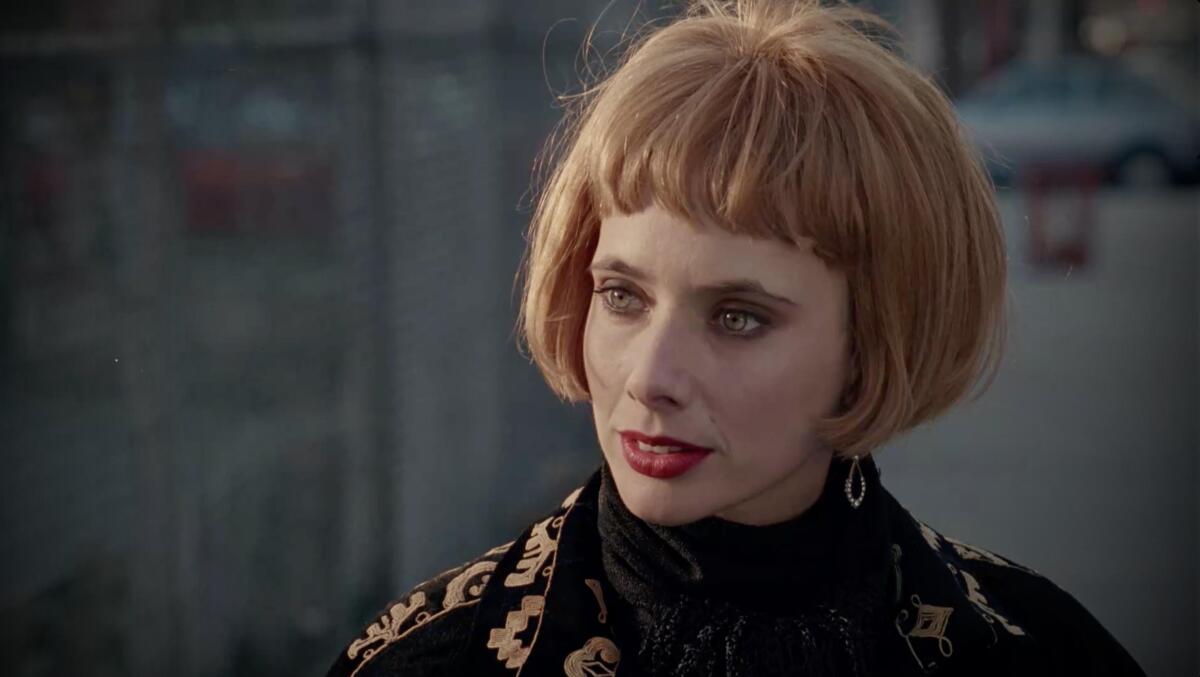
Rosanna Arquette in the movie “The Linguine Incident.”
(Richard Shepard)
As every company involved with the movie had gone bankrupt during the intervening years, it was a three-year odyssey for Shepard and his friend and producer Sarah Jackson to unravel the rights issues. Eventually they discovered the rights were actually held by the Screen Actors Guild because residuals hadn’t been paid. Then began the process of finding the original elements of the film. Thanks to an Austrian revival house that had played the film some eight or so years ago, a 35 mm print and a copy of the negative of a longer European version were discovered and a new 4K transfer was created.
Working with editor David Dean, who also cut Shepard’s 2018 film “The Perfection,” Shepard was able to add in some footage not in the original U.S. version, create zooms and reframing and generally tighten the film to improve its pacing.
“I’m very well aware that this isn’t like the restoration of ‘Touch of Evil,’ ” said Shepard. “But it is a very particular movie about a very particular time. Rosanna Arquette’s great in it, Buck Henry and André Gregory and Marlee Matlin and really, most of all, David Bowie in a role no one’s really ever seen him play before. And that was sort of the motivator: Hey, let’s reintroduce this movie to a different audience.”
Shepard had originally conceived of getting Bowie and Mick Jagger to play the roles of the two restaurant owners ultimately played by Henry and Gregory, so he sent the script to the two rock stars. He never heard back from Jagger, but Bowie quickly got in touch to say he’d read the script and wanted to play the lead.
On working with Bowie, who died in 2016, Shepard said, “There’s been a lot of discussion about Bowie since he’s passed away, and a lot of looking back at his films. And my film is never mentioned. I accept that it’s not in the same pantheon as ‘The Hunger’ or ‘The Man Who Fell to Earth,’ but it is such a specifically different sort of role for him. It’s always been frustrating and I think it’s because people just don’t even know it exists.
“But the fact was that the movie very much captured him,” added Shepard. “At least in my brief four months of my life in his presence, he was just an engaging, engaged, lovely, funny man. He was interested in everything in a way that seemed definitely genuine. And so much of the funny stuff that he does in the movie was completely improvised by him.”
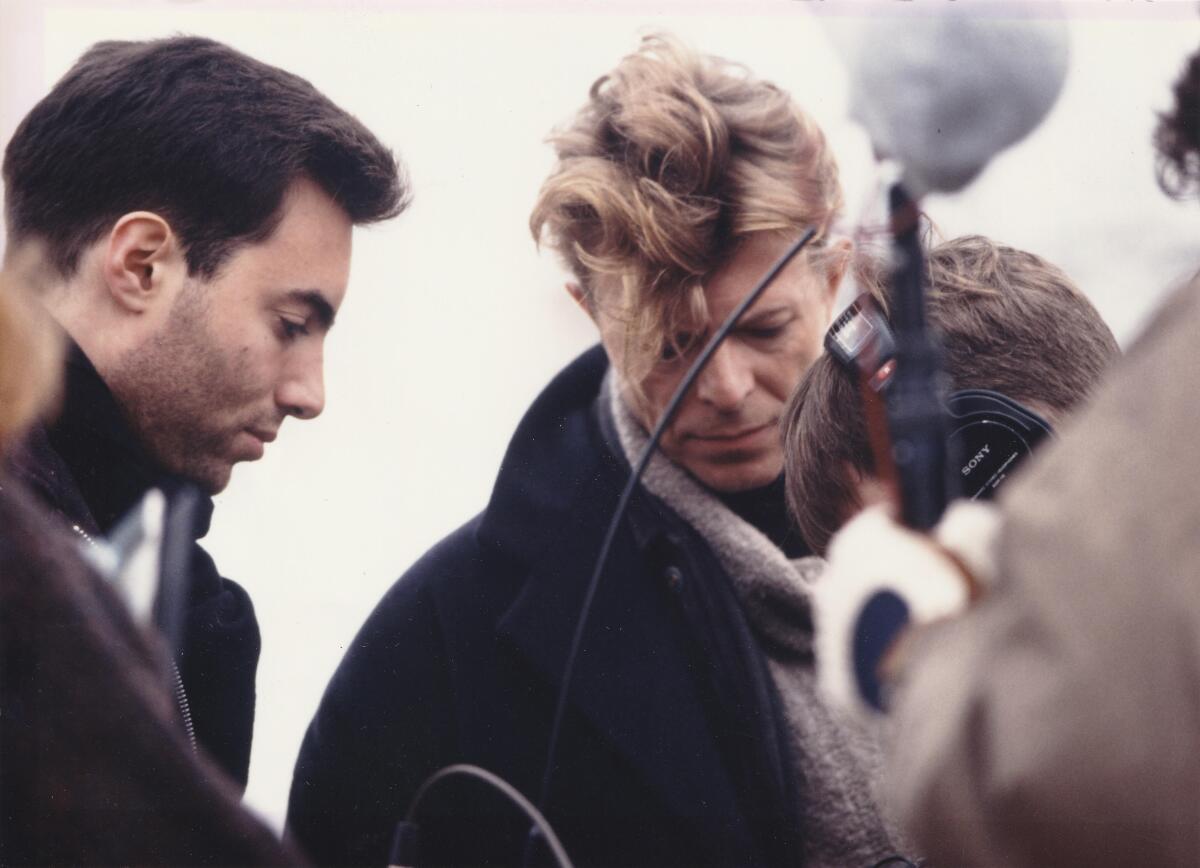
Filmmaker Richard Shepard, left, and David Bowie during the production of “The Linguine Incident” in 1990.
(Richard Shepard)
Bowie had finished his extensive worldwide “Sound + Vision” tour just before filming, which was billed at the time as the music superstar saying goodbye to many of his greatest hits and dropping the varying personas he had previously adopted on stage.
“I think he just loved playing someone a little bit more like himself or a little bit more grounded as a human being,” Shepard noted. “He very much wanted to show that he had the chops to be funny and to be charming. And he just was that, both in front of the camera and then going out to dinner or going to clubs or listening to music or all the things that I got to do with him. He just had that energy.”
Shepard added that the process of creating this new director’s cut has also been meaningful for allowing him to reconnect with Arquette and Balint.
“We’ve really become close,” Shepard said. “And to be able to have them back in my life and to be able to talk about the good things and the bad things from that experience is actually its own level of gift. You know, movies that are hits, the cast always stays in touch. And whenever you see each other, it’s all great. Movies that don’t work, it lends a pall over the experience. To be able to sort of reclaim the experience in its own way, I think has been actually really satisfying for me and for them.”
‘I Saw the TV Glow’
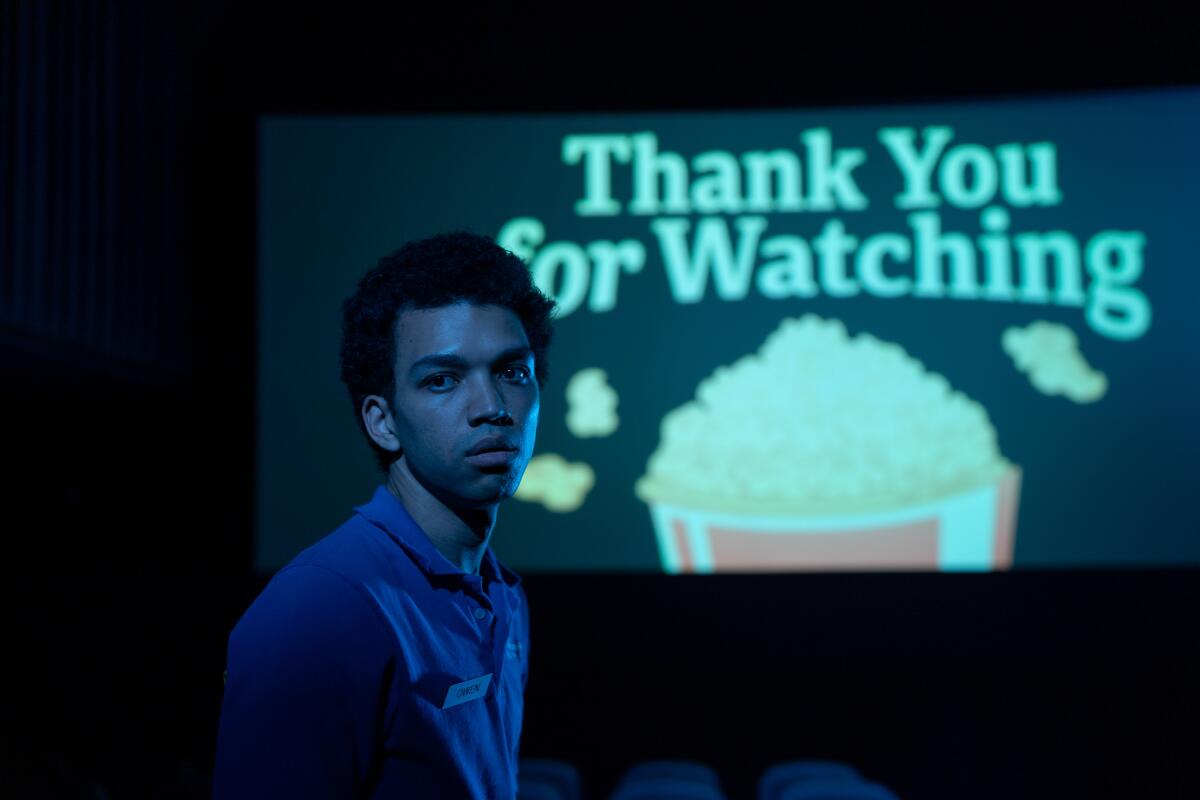
Justice Smith in the movie “I Saw the TV Glow.”
(Spencer Pazer / A24)
One of the most talked-about films of the year since it premiered at Sundance is Jane Schoenbrun’s “I Saw the TV Glow.” Set in the 1990s, the story follows two teenagers (Justice Smith and Brigette Lundy-Paine) bonding over a mutual fascination with a “Buffy”-esque television series, “The Pink Opaque.” Over time, their sense of reality begins to blur and transform, keeping the two of them connected even as they go their own ways.
Though admitting to some restlessness while watching the film, Amy Nicholson, reviewing for The Times, owned up to being “haunted by its residue.” Her review is here.
In an interview with Carlos Aguilar for the paper, director Schoenbrun said, “The movie is interested in the sadness, loneliness or perhaps even sinister nature of emotionally investing so deeply in fandom.”
Without spoiling the enigmatic conclusion, it is fair to say that the film also examines how people can change and develop over time.
“That’s maybe me exploring my relationship with myself and not wanting to play into the very Hollywood, Western-narrative idea of resolution or catharsis that allows an experience or a book to be closed,” Schoenbrun, who is trans, said. “Because to me, transition is lifelong. And in fact, I don’t know that I like the word transition. I like the word healing.”
Other points of interest
Warren Beatty’s ‘Dick Tracy’
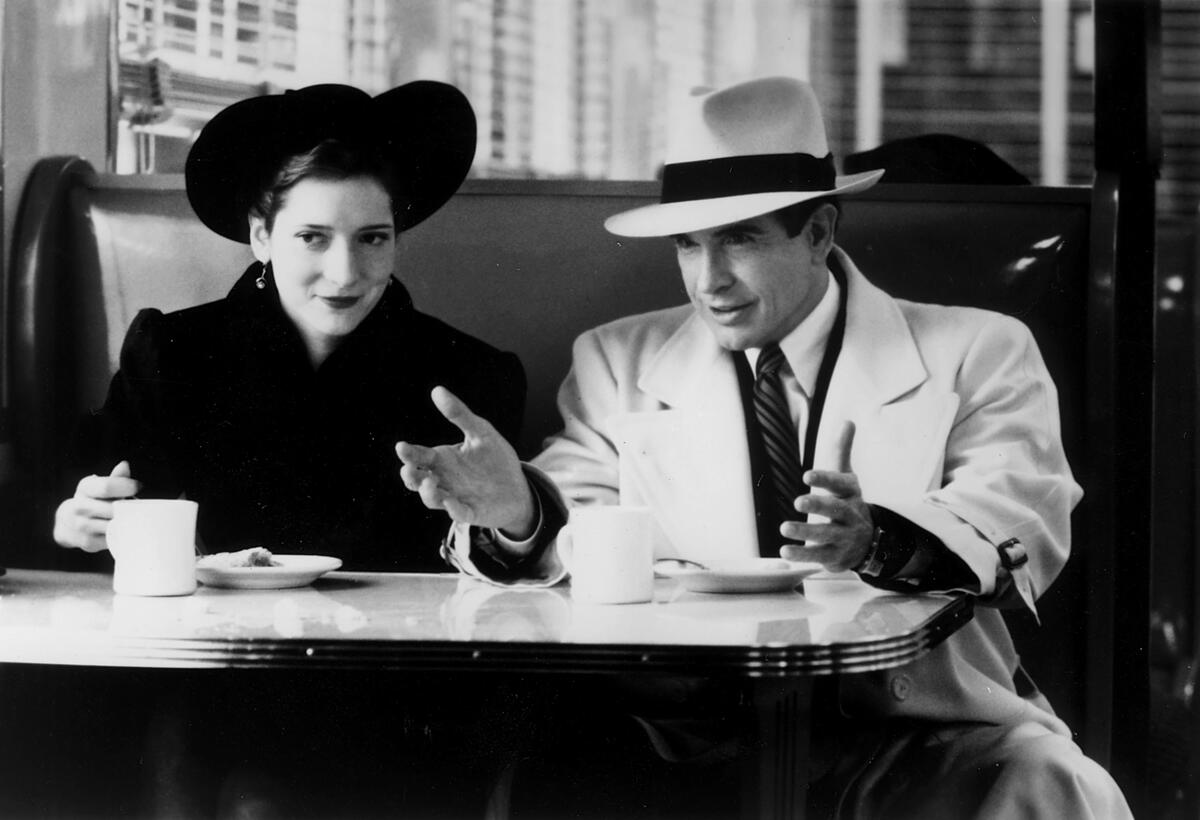
Warren Beatty and Glenne Headly in 1990’s “Dick Tracy.”
(Peter Sorel / Touchstone Pictures)
The Branch Selects series at the Academy Museum, in which members of the different branches of the academy select a movie, is honestly one of the best, most consistently invigorating series in town. It’s as if a friend said, “Hey, you know what movie we should watch?” and then was able to show it to you in one of the best theaters in town.
On Wednesday, the program will show Warren Beatty’s 1990 adaptation of “Dick Tracy” in the gigantic David Geffen Theater. The film has been selected by the visual-effects branch with an introduction by Harrison Ellenshaw, who worked on the film.
“Dick Tracy” is a deliriously strange movie, with a whimsical, knockabout energy and every shot being a feat of technical imagination achieved by an impossibly accomplished team of craftspeople, including the production designer of “Chinatown,” the costume designer of “Barry Lyndon,” the cinematographer of “Apocalypse Now” and the editor of “Broadcast News.” Additionally, there are original songs by Stephen Sondheim. The cast includes not just Beatty but Al Pacino, Dustin Hoffman, Paul Sorvino, Seymour Cassel, James Caan, Mandy Patinkin, Kathy Bates, Dick Van Dyke and Madonna. The film would go on to win three Oscars.
In her original review of the movie, Sheila Benson wrote, “You gotta give it to the gumshoe: ‘Dick Tracy’ is brash, irresistible fun. Warren Beatty’s vision of a comic strip on film comes in paint box-bright colors with nicely irreverent dialogue, a gaggle of crisp performances and one with million-dollar moxie. It’s a film of enormous style, with a sure sense of itself. You may not exactly brood about the inner lives of these characters for days after you leave the theater — then again, for better or worse, that may be one of the definitions of a summer movie.”
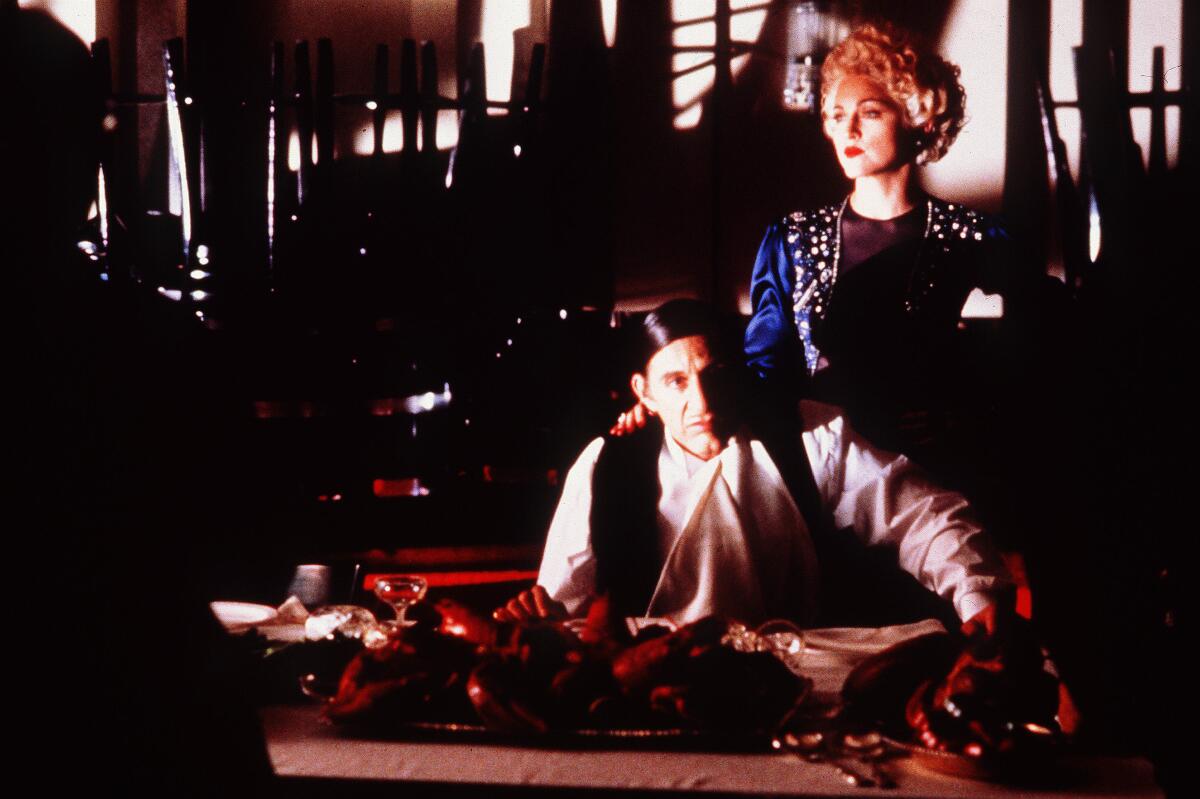
Al Pacino and Madonna in the movie “Dick Tracy.”
(Touchstone / Kobal / Shutterstock)
The Times covered the release of the film so extensively — 15 stories across three weeks in multiple sections of the paper — that it raised questions of whether the paper had become too friendly in its coverage of Hollywood. The film editor at the time, Jack Matthews, wrote an epic profile of Beatty, in which a scheduled two-hour interview turned into nine hours and dinner at Mandarette Chinese Café. (Still open, by the way.) In what is perhaps the most Warren Beatty line ever spoken by Warren Beatty about Warren Beatty, he addressed his public image by saying to Matthews, “Listen, I’ve been famous since 1960 and… and… I’ve been lucky.”
Matthews also wrote a piece on achieving the jewel-toned comic-strip look of the film.
“It’s impressionistic, but to use Warren’s phrase, it’s impressionistic apple pie, simple American values,” said art director Richard Sylbert, who would win an Academy Award for his work on the film. “This is not ‘Metropolis.’ This is about a guy who has a girlfriend and hates lawbreakers.”
As Beatty put it, “I don’t know if I have fun watching myself, but I do enjoy watching my hat and coat.”
Michael Mann’s ‘Blackhat’
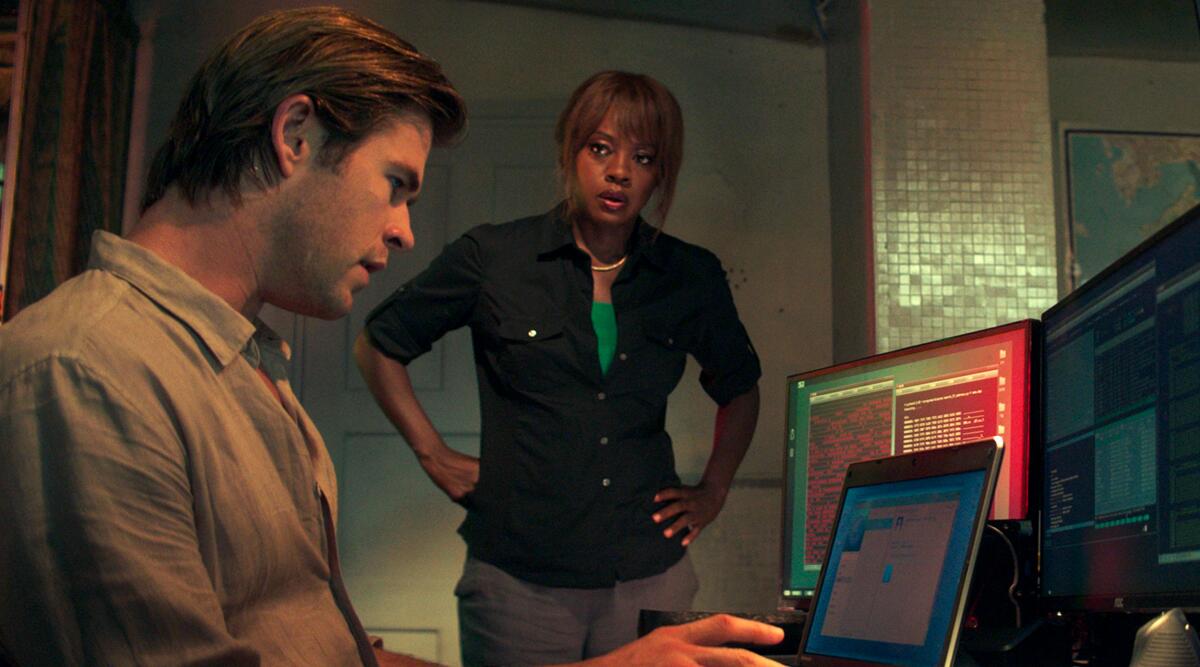
Chris Hemsworth and Viola Davis in Michael Mann’s 2015 thriller “Blackhat.”
( Frank Connor / Legendary Pictures / Universal Pictures)
Tonight, Vidiots will be screening Michael Mann’s 2015 “Blackhat” with an introduction from actor Timothy Simmons, an avowed fan of the film. It is a rare chance to see the film in a theater; “Blackhat” flopped at the box office on release but has acquired a feverish fandom in the years since.
The story is a globe-hopping cyberthriller starring Chris Hemsworth as an imprisoned computer hacker who is released on furlough to assist in catching the unknown criminal behind a series of sophisticated global online attacks that have brought down a nuclear power plant in Hong Kong and an American commodities exchange. The cast also includes Viola Davis, Leenhom Wang, Tang Wei, Holt McCallany and John Ortiz.
In his original review of the film, Times critic Kenneth Turan noted that “at its heart this is a traditional crime story, with the good guys straining every sinew to keep evildoers from their moment of triumph.” However, he declared Hemsworth the weak spot in the film: “Oddly reminiscent of Marlon Brando’s anti-social glowering in ‘The Wild One,’ the sullen cast he gives to the role testifies to his lack of comfort as much as anything else.”
I interviewed Mann ahead of the film’s initial release. He spoke about his exhaustive pre-production research process and how that informs his storytelling in a way that could also apply to many of his other films, from “Heat” to last year’s “Ferrari.” As Mann said, “I like doing immersive research. You bring yourself into a culture to the point where you can get some semblance of an understanding of the patterns and the rhythms and the mores and the values and how people think, how they feel, what they want. I like that journey.”
Late last year, a home video release from Arrow Video — with a dazzling 4K transfer of the theatrical cut and a lower-resolution disc of Mann’s director’s cut that restructures the film — cemented the burgeoning status of “Blackhat” among Mann aficionados. It also made the case for why physical media can be so vital.
In other news
Slamdance is moving to L.A. This week I broke the news that the Slamdance Film Festival will permanently move to Los Angeles beginning with the 2025 edition. The festival will also move to a spot on the calendar in February.
Slamdance was started by a group of filmmakers who had been rejected by programmers at the Sundance Film Festival and has long taken place in Park City, Utah, concurrently with Sundance. Over the years, filmmakers including Christopher Nolan, the Russo brothers, Lena Dunham, Greg Mottola and Bong Joon Ho have had their early works screen at Slamdance before they broke big elsewhere.
“We felt that there was space for us in the Los Angeles melting pot to really contribute and to continue the mission of what Slamdance is all about — discovering filmmakers,” said Peter Baxter, president and co-founder of Slamdance.
The news comes in the face of the recent announcement that Sundance is accepting applications from other potential host cities for 2027, when its contract with Park City expires.
‘The Idea of You’ producer Cathy Schulman
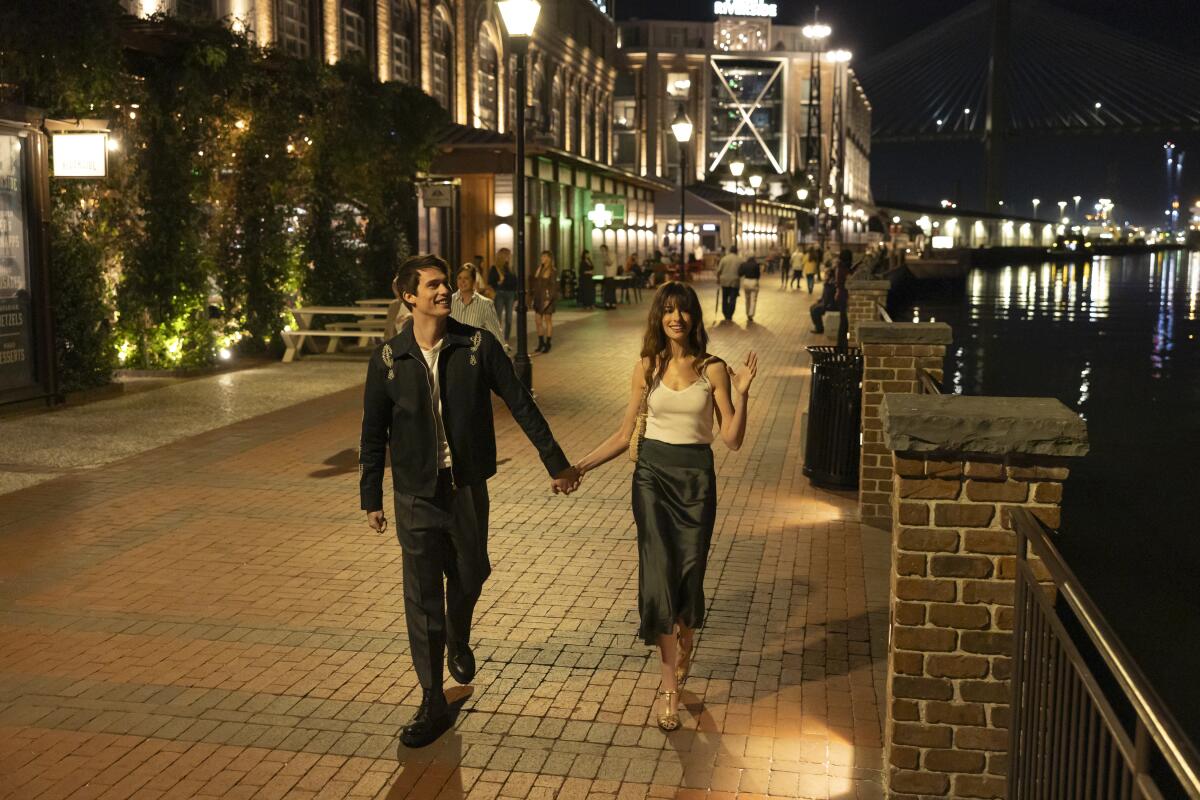
Nicholas Galitzine and Anne Hathaway in the movie “The Idea of You.”
(Alisha Wetherill / Prime Video)
For his “The Wide Shot” newsletter this week, Ryan Faughnder spoke to Cathy Schulman, the Oscar-winning producer who is behind the new Amazon Prime Video release, “The Idea of You,” a sexy rom-com directed by Michael Showalter and starring Anne Hathaway as a divorced Sliver Lake mom who finds herself in a fling with an international pop star.
Having premiered at South by Southwest in March, the film is going straight to streaming. Considering the recent box office success of “Anyone But You,” there is an apparent audience for escapist romantic fare, which begs the question of how much “The Idea of You” might have made with a theatrical release.
“The whole decision rested in Amazon’s hands and we heard a lot of analytics about why they made that decision,” said Schulman. “As a filmmaker, I just come out firmly on the side that I love the theatrical experience, and so it’s hard for me to imagine not wanting that, especially with something that I think crowds will love. Amazon’s analysis of the marketplace suggested that the greatest chance of success would be done this way, and those are our partners and we have to follow their lead. It’ll never make that soulful missing of the theatrical experience go away. But as a businessperson, I have to look to the distribution experts.”
‘The Fall Guy’
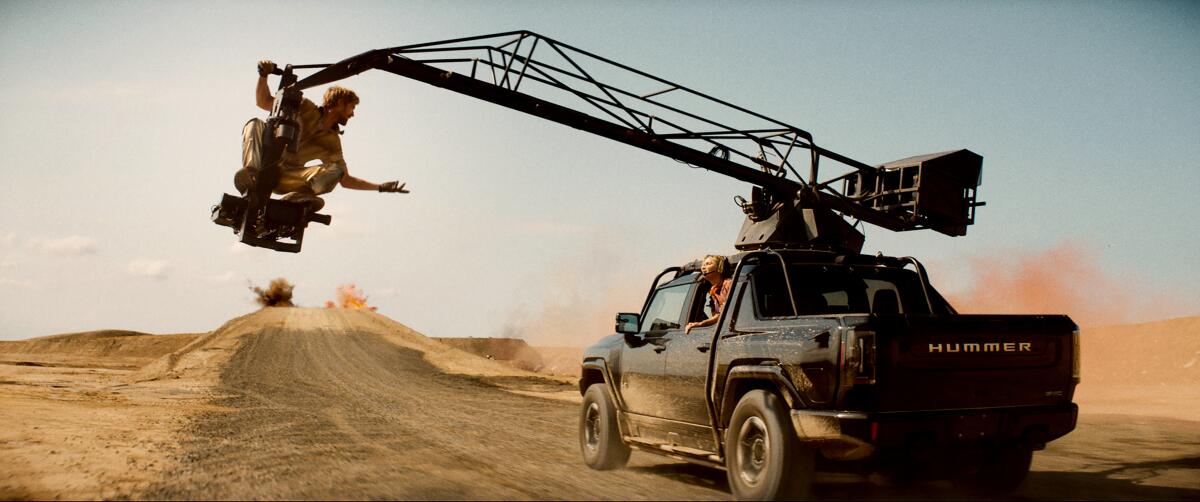
Ryan Gosling and Emily Blunt in the movie “The Fall Guy.”
(Universal Pictures)
With both “Civil War” and “Challengers,” there have been actual good, original movies atop the box office charts in recent weeks. That looks to continue with “The Fall Guy,” director David Leitch’s affectionate adaptation of the 1980s television show about a Hollywood stuntman named Colt Seavers.
Starring Ryan Gosling and Emily Blunt, the film is a tribute to the stunt community, but it is also a surprisingly effective romance, with the palpable chemistry between its two leads making for a fleeter, more tender energy that the typical thudding Hollywood action flick.
In Glenn Whipp’s review of the movie, he notes the “easygoing groove” between Blunt and Gosling in scenes such as one where they talk out their relationship issues while also filming an action sequence with Blunt as director and Gosling as stunt performer.
As Glenn wrote, “It’s one of several scenes where the film smartly uses stunts to reveal character, advance the story and make good use of Gosling’s gift for physical comedy. If Colt can’t signal thumbs-up at the end of a stunt, it’s not just a blow to his ego. He’s working his way through a bewildering cloud of confusion — not to mention being a suspect in a murder investigation — that even a pitcher of spicy margaritas (nobody says ‘spicy margarita’ better than Emily Blunt) with his lovely lady won’t be able to solve.”
‘Blood In Blood Out’ streaming at last
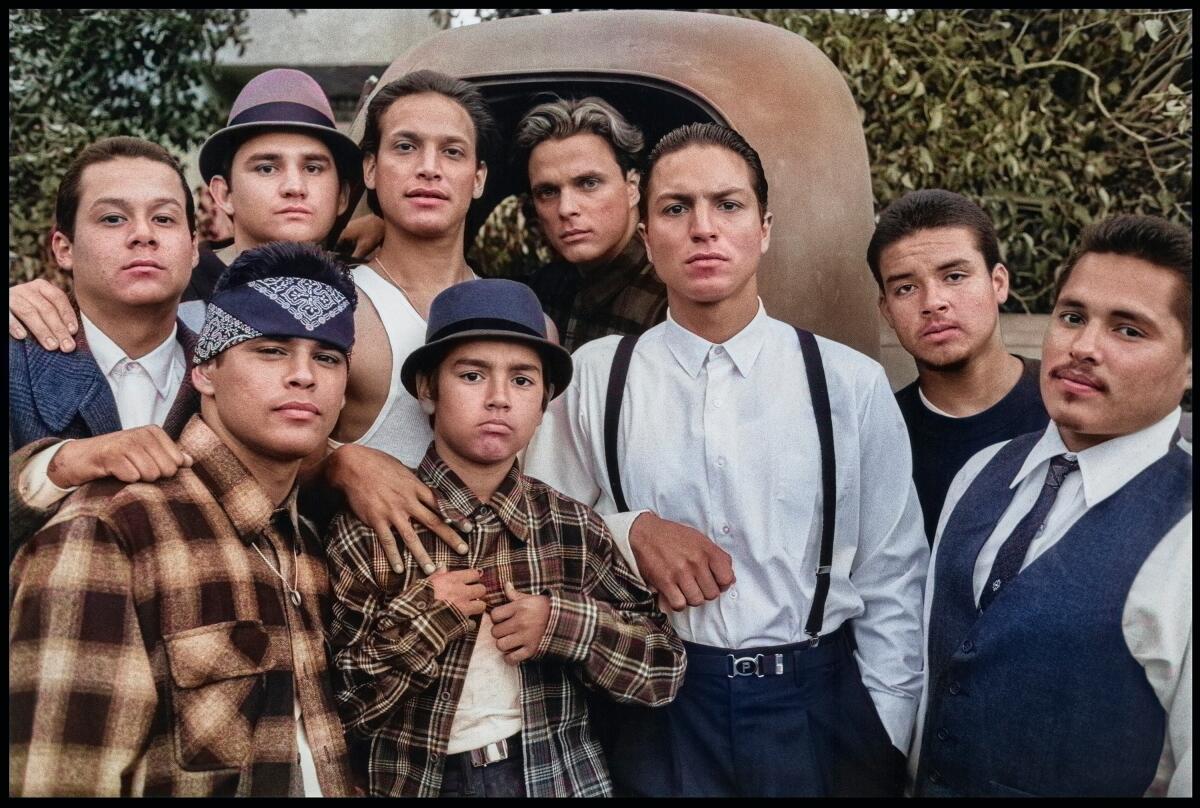
The cast of the 1993 film “Blood In Blood Out.”
(Merrick Morton / Hollywood Pictures)
Taylor Hackford’s 1993 crime drama “Blood In Blood Out” is at long last available for streaming, arriving this week on Hulu.
The film follows the lives of three cousins in East Los Angeles and though it had a stunted initial release — Disney didn’t quite know what to do with it — once on home video it was widely embraced by Latino audiences. One unauthorized YouTube upload brought in more than 6 million views.
At an event in January, hundreds of fans packed an auditorium at Cal State L.A. for a screening in celebration of the release of a book on the film.
“This 30th anniversary of ‘Blood In Blood Out’ — both the screening at Cal State L.A. and the publication of our book by Hat & Beard Press — has been a once-in-a-lifetime experience for the entire cast and crew,” said Hackford.
“Now, Hulu’s decision to stream the original unedited version is the cherry on top of the cake, both for us and for the Latino community across the U.S. who have made this film the classic that it is.”
